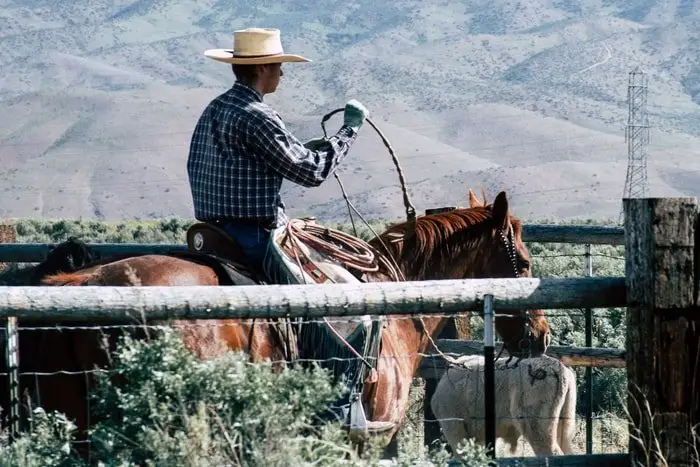If your horse exposed to an unknown environment or situation and also in new work, the horse stress may arise without any disease that is abnormal for the comfort of your horse. The stress condition in horses you will notice after bad handling or faulty transportation in such a place or by a person involved ensuring care for your horse. The signs of horse stress you are overlooking many times due to ignorance of the causes of horse stress. If you are not addressed and identified equine stress properly, your horse’s performance and work will be affected.
Types of Horse Stress
Stress can affect the health issues of your horse and however, the horse stress can be controlled or maintained. Equine stress will trigger the “fight or flight” effect caused by the release of cortisol hormone. In a stressed condition, there is the frequent release of cortisol hormone which may affect the digestive, respiratory, cardiovascular, immunological system. The stress condition may be manifested by diarrhea, colic increases heart and respiratory rate, and also the behavior of your horse.
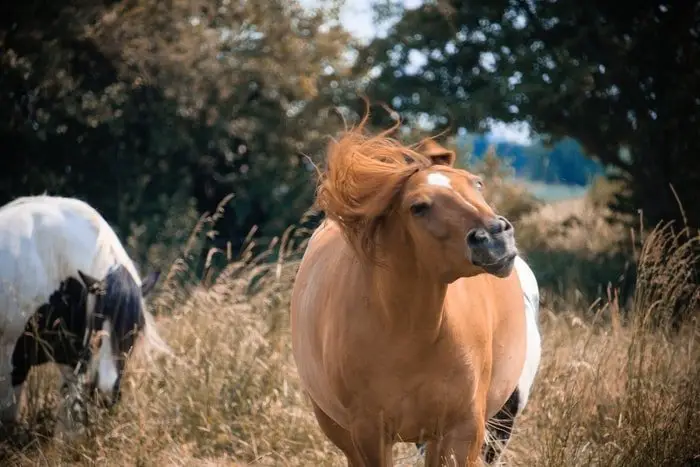
1. Continual Equine Stress
In continual stress, there is the regular release of cortisol hormone from the gland. The equine stress hinders the availability of blood glucose that suppresses the brain function of your horse and weakens the muscle.
Read More: 18 Most Common Horse Diseases: You Must Know As Horse Owner
This also decreases the availability of blood glucose for the muscle which decreases the athletic performance of your horse. The release of cortisol will also affect the immune system that’s why your horse may suffer from different diseases. The recovery rate of stressed horses from respiratory or systemic disease is more than that or healthy horses.
2. Short-Term Equine Stress
The normal signs of short-term horse stress are frequently whining or squealing, shyness of horse, tense muscle, restlessness, tense muscle, carrying the head high, frequent and wild tail tossing, flared nostrils, and snoring and shaking or trembling.
3. Long-Term Equine Stress
The long-term horse stress can increase the risk of behavioral problems which includes changes in disposition or attitude, decrease in appetite or feeding habit, unpredictable reaction including bucking, bolting. In long-term horse stress, some bad behavior may arise like box walking, weaving, cribbing, and licking.
The stressed horses may crib their incisor teeth in some objects like stall wall or fence and ground, may suck air by arch their neck, and show their teeth. The horse in stress may also wave their heads side to side.
Common Causes of Equine Stress
There are many causes of stress in the horse. The main causes change the routine and environment, change feed, bedding, and work pattern also. Any unnatural activity started suddenly in your stable or horse management and also related to feeding, pasture, watering or any tiny change that may also lead to equine stress.
1. Inconsistent or Frequent Feeding Schedule
You must maintain a constant schedule for feeding and watering of your horse. Horses are spent a considerable amount of time for grazing. The horses in the pasture will follow a natural inclination and you must maintain a regular time of in and out of the pasture. The feed supplied to horses will be of good quality and have adequate nutritional value.
2. Minimum Exercise
Horse stress is reduced by a regular and frequent interval exercise with the expert rider. You must look into the matter that your horse must be over-exercised at any point.
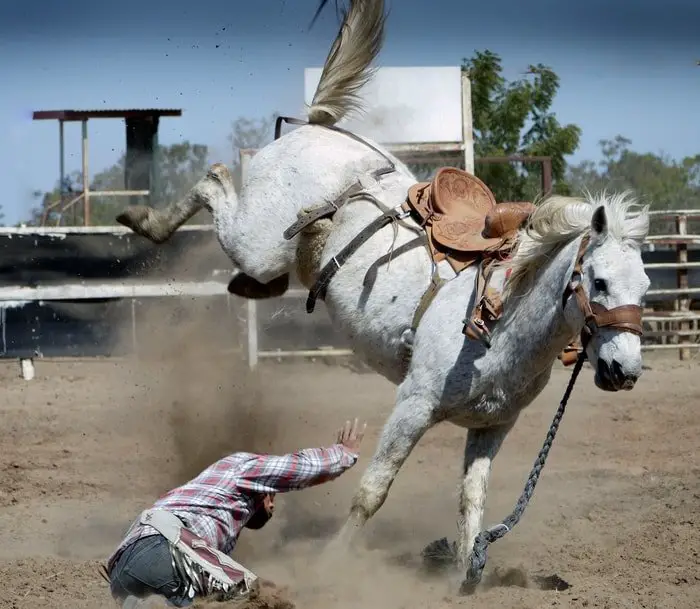
3. Boredom
Horses are social animals and like to live in an environment with other horses. There are some bad behavior like cribbing, weaving and other stable vices arise if your horse staying lonely or in boredom condition. The socialization and keeping horse with its mates at paddock will reduce stress a lot.
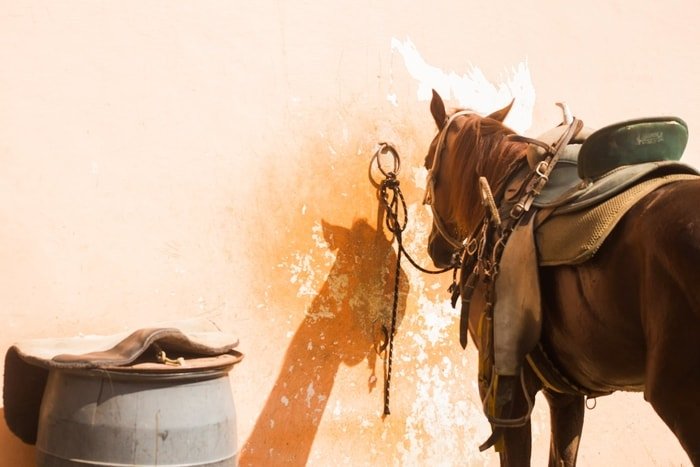
4. Isolation or Loneliness
Horses are liking to stay in a group and they are getting support and feels security from their herd mate. If your horse does not get into the pasture or stall mates that may lead to stress. You must stables your horses together and give a social and healthy environment to reduce stress.
5. Unfamiliar Environment
The horse’s natural sense is very powerful regarding sight, smell, and surrounding sounds and they are very curious about their environment. Your horses may get stressed if he faces too many sudden or dramatic changes in their environment or increased stress levels in their handlers. The unfamiliar routine like an even visit from a farrier or vet may also lead to stress.
Read More: 10 Most Common Gaited Horses: You Must Know as a Horse Rider
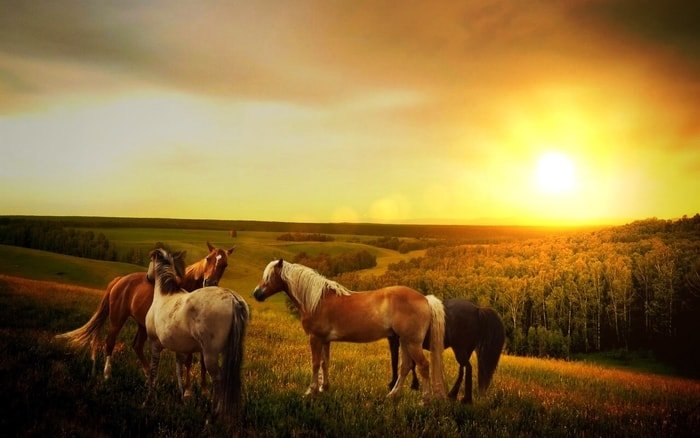
6. Loss of Weight
Horse in stressed condition will lose weight chronologically and you will notice after a considerable time. Though there are a lot of causes of weight loss like infectious, parasitic, nutritional, or managemental factors you must look into the matter carefully. The weight of a horse must be maintained at a constant ration to maintain good health conditions.
7. Yawning
When we are tired most of us yawn and our lungs took more oxygen than the normal time. But in case of the horse, the yawning is not very common and when you observe the yawning in your horse the horse may be in stress.
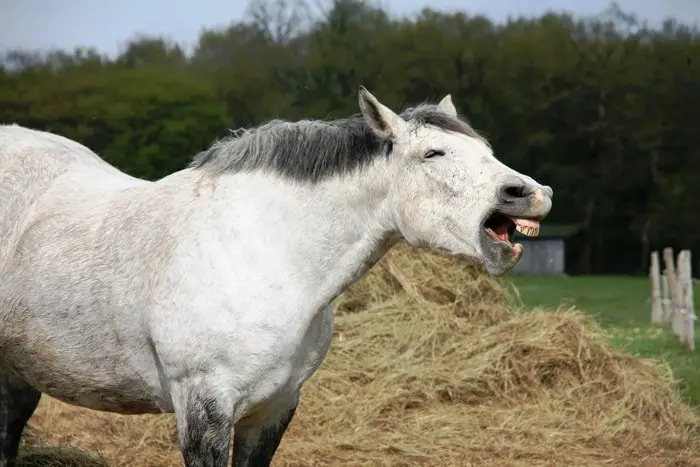
Most Common Horse Stress Symptoms
Stress is sometimes natural to the body and observed in the horse in many ways. As a horse owner, you must be very conversant about the behavior and habits of your horses. The following behavioral symptoms are observed in horse stress in my opinion from different levels of pieces of information.
1. Stall Walking and Other Vices
When you observed in your horse it is walking in a specific wall, again and again, cribbing, wagging, waving, or kicking around the wall of the stall then your horse may be at stress.
Read More: 15 Most Common Horse Hoof Diseases: You Must Know As Horse Caregiver
2. Tooth Grinding
You may also observe that your horse may grind tooth while in stable or during riding. The condition of tooth grinding may arise from physical or psychological behavior. If there is no other issue like problems in tooth and disease the horse may be in stress.
4. Bad Behaviour
The unusual behavior of your horse during riding or in rest is due to horse stress. The bad behavior originates from physical or physiological matters and expressed by pawing, pulling, tail wringing, bucking, bolting of food, rearing or even cold bucking.
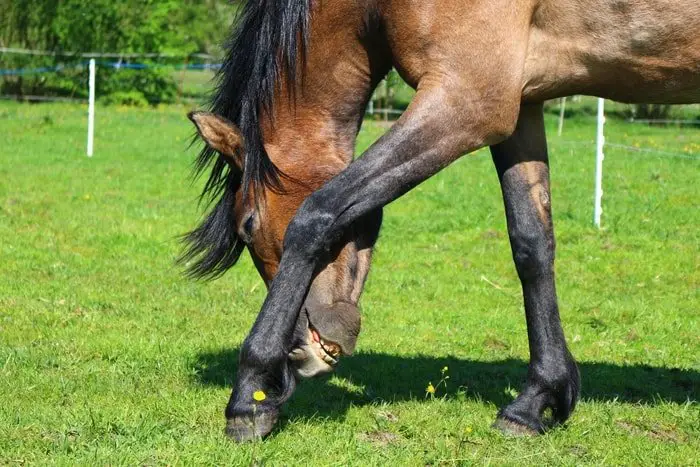
5. EGUS
Many performances of horses may suffer from equine ulcers and gastric problems. These may felt your horse in the stressed condition and hamper the performance in a significant way.
5. Manure and Urination
If you have seen your horse is producing an excessive amount of manure in a short time, it may be in stress. The horse may also defecate abnormal feces like watery or like the cow dung. The horse stress also produces frequent urination even in the trail or during riding if your horse is unable to relax.
6. Licking and Chewing
Licking and chewing are the signs of your horse are getting new information or the environment. The horses are in stress may develop the habit and express the behavior in various ways.
7. Equine Colic
Colic may arise from many causes in horses and one of the most important causes is that your horse is in stress. If you introduce a new herd mate or change any routine all of a sudden your horse may show mild colic and it will result from horse stress.
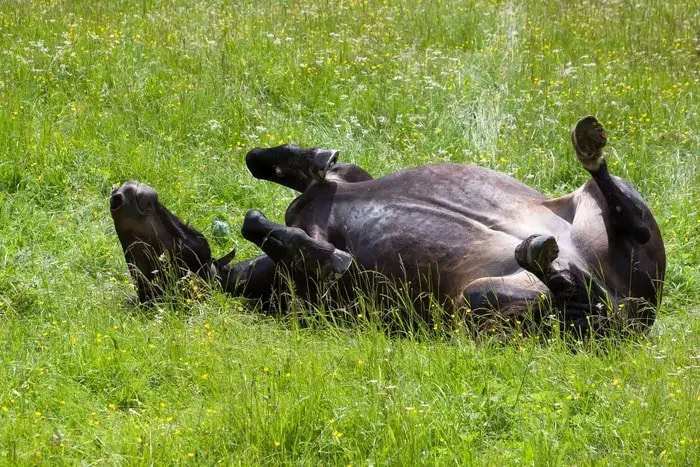
8. Trembling
Your horse may tremble at any stressful condition. The appearance of veterinarian, farrier, or new trail may lead to horse stress. The stress removed as the causes disappear.
9. High Pulse and Respiration
In any stress condition, the rate of heart and respiration increases significantly than normal. As a horse owner, you must be very familiar with the normal temperature, pulse, and respiration of your horse. There are some conditions when the rate is more than normal like after riding or bring back from pasture.
10. Sweating
If your horse in stress the temperature, pulse, and respiration increased and at the same time it will start sweats. The horse’s saddle area, between the two legs and neck region showing the excessive sweating.
11. Bolting Food
If you watch that your horses are making its food bolting it may be in stress. The bolting food may lead to choking and that may happen in the stall or during grazing.
Recommended Read: Most Easy Methods of Identification of Horses
12. Chewing or Biting
Some horses may express their stress by chewing unwanted materials or substances in around them. If you noticed such a thing, you should immediately look into the matter and consult your vet.
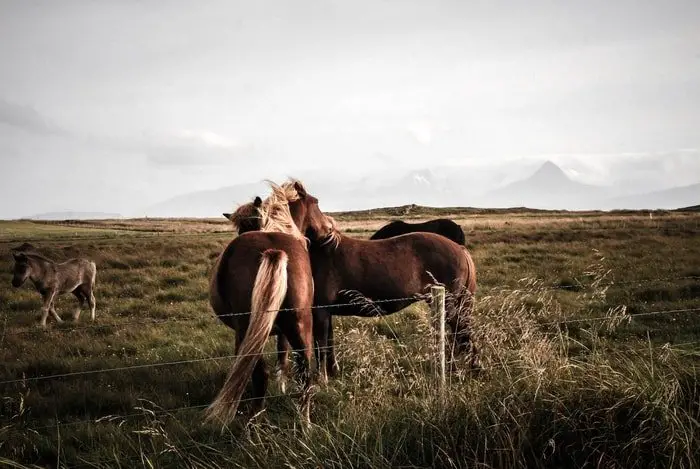
Ways To Reduce of Horse Stress
As a horse owner, you can reduce your horse stress most of the cases by keenly observing the causes of stress. If you properly identify the causes of stress, 80% of the problem you can remove. The following points will help you to reduce horse stress.
- You must provide a consistent schedule for the natural environment or as much as the possible familiar environment.
- You will make your horse with the frequent turnout, ample access to food, water, and companionship.
- You must give sufficiently to familiar with new herd mates, pasture, new stables, and environment.
- You must give a smooth ride in the first trailer.
- Good care and management practice can reduce almost all the stress in your head.
- If your horses got sick, take immediate action to relieve the sickness.
- Give your horse familiar foods and most of its food should be forage-based.
- Give your horse a regular training and over-exercise should be avoided at any cost.
- Maintain a healthy environment of your horse like free from noise and disturbs.
- Keep constant contact with your veterinarian to discuss freely every problem at the very outset.
In Conclusions
Equine stress is very often in the stall or pasture you will face at regular interval and there are many causes of the stress condition. As a horse owner, you must know the causes of stress at the very beginning and you must identify the cause accurately. There is no specific treatment of equine stress just to remove the cause and take action as per the cause.
Read More: 15 Most Popular Race Horse Breeds You Must Know As A Horse Racer
I think the above pieces of information will help you a lot to diagnose the stress and remove it at a first go. If the discussion helps you please subscribe to our website to get the latest informations and share via social media.
